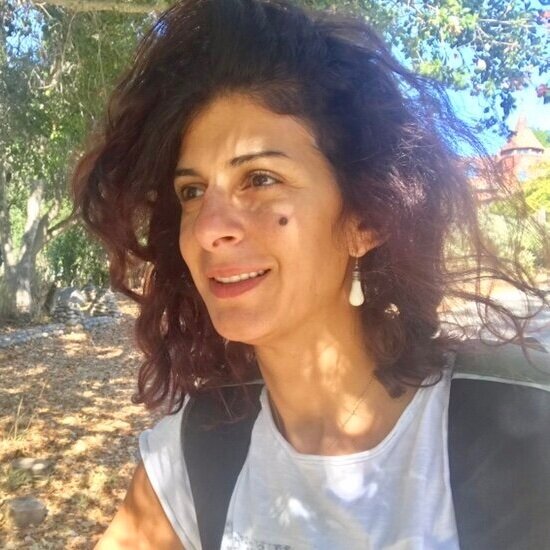the place where I’m from
mai serhan
I’ve never been to where I’m from. When my father was alive, he would reminisce about a huge manor with a horse stable and wine cellar. I was told my grandmother, Ibtihaj al-Qadi, took her children and fled through olive trees under a hail of bullets in 1948. My uncle, Nabil Serhan, then six years old, was shot in the palm of his hand, or so the story goes. As for my grandfather, Faris Serhan, he chose to stay behind to fight with the rest of his village. Years later, I picked up Gate of the Sun by Elias Khoury and found a detailed account of the battle for our village: “If we’d fought throughout Palestine the way El Kabri fought,” it read, “we wouldn’t have lost the country.” The record can be found on page 166, now along with a yellow Post-it bearing a huge smiley face and the proud word, Jeddo, Palestinian for Grandpa.
The Serhan family relocated to Beirut. The apartment on Barbour Street was a much simpler affair. The hilarity of the name does not escape me now. I, being raised in Egypt, speak Egyptian; “Barbour” in Egyptian means “booger.” I wonder today how that small apartment managed to contain four fiery boys and their equally hot-tempered sister. She was the cleverest, but money was tight after Palestine, and since the family needed to prioritize, she stayed home while her brothers pursued university degrees. What a rowdy home it must’ve been before they all disbanded. I used to stay in that apartment during my summer holidays after the Lebanese Civil War. What remained of that grand life my father so fondly spoke about was a very robust Palestinian kitchen and a portrait of Faris Serhan on the wall wearing his tarbouche. The day Jeddo died, my father sobbed until his nose bled. It was the first time I had ever seen him cry. Looking back now, I know he cried then for much more than a father; he cried for that place where we’re from.
The idea of that place slowly receding from memory troubled my father for the rest of his life. I remember that one time in Beirut when he asked me to go down to the supermarket to buy labban and I came back with a bottle of milk. My father looked at me in horror, before horror gave way to rage. You see, labban, where I’m from, means yoghurt, and halib means milk. But I, being raised so far from where I’m from, knew labban as milk.
When the Civil War broke in Lebanon, Ibtihaj al-Qadi was forced to pick up and leave once again, this time to Limassol, Cyprus, where she waited for the war to end for fourteen years. Every summer, my cousins and I would descend on this pretty beach town from all corners of the earth. My father would line us up and ask us, one by one, to come forward, say our full names and where we’re from: “May Nizar Faris Nayif Mohamed Ali Khayr Serhan. Palestinian from El Kabri,” I would say.
Ibtihaj al-Qadi died exactly two decades after her husband, ironically, of Alzheimer’s disease. Her sons all died shortly after, leaving my Aunt Nadia as the last surviving witness to Palestine. I visited her recently in Beirut. We drove her down to Saidon in the South of Lebanon, the Israeli border providing a cutting backdrop to her non-stop stories of exile. “We entered through that border,” she said, “in a truck. We didn’t know we’d never go back.”
The Internet tells me that El Kabri had 400 inhabitants and many springs: ’Ayn Mafshuh, ’Ayn Fawwar, Ayn al-'Asal, and 'Ayn Kabri, which together formed the largest freshwater source in Palestine. It was a bountiful place with lush fig, olive, pomegranate, apple, berry, citrus, and banana trees. I look up and imagine my father running freely across the valley before stripping down and jumping into the crystal-clear river. He would then come out to dry under the sun before plucking fruit off the trees on his way home. But that could very well be an embellishment too.
When Jeddo left Palestine after its fall, those who left after told him that the Haganah, or the Jewish underground militia, were showing his photo to people, asking about his whereabouts. “Tell Faris Serhan, we will hunt him down,” they would say to some as they fled. They sure tried to hunt him down. I was told they once left an explosive gas cylinder under the stairs of his residence in Beirut. My family name will likely prevent me from seeing that place where I’m from. So, I’ve learnt to cope with this reality in the little ways I can. I named my daughter, Nadia, after my aunt, the last surviving witness to Palestine.


